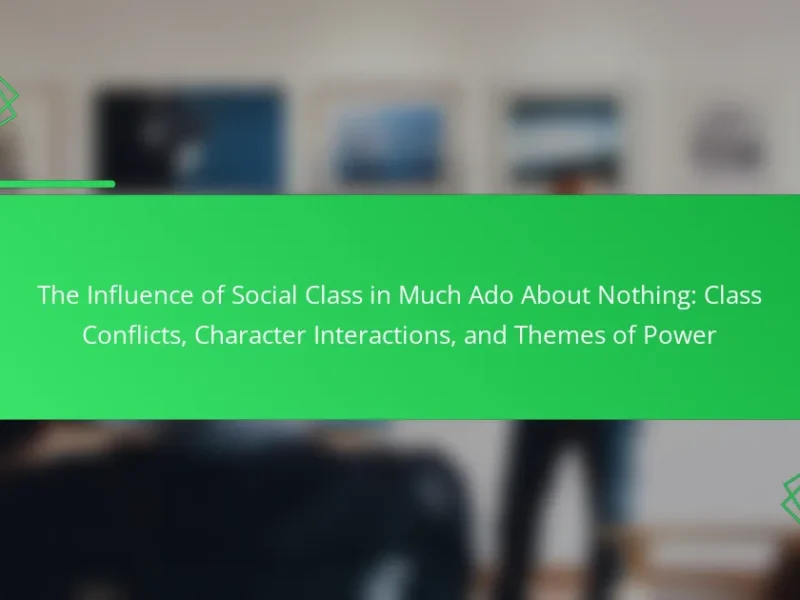
What is the significance of honor in Much Ado About Nothing?
Honor is a central theme in Much Ado About Nothing, impacting character relationships and societal expectations. It drives the actions of key characters, particularly Claudio and Hero. Claudio’s public shaming of Hero highlights the importance of reputation and honor in their society. Hero’s perceived loss of honor leads to her apparent death, illustrating the severe consequences of honor-related conflicts. The restoration of Hero’s honor is pivotal for the resolution of the play. Ultimately, honor shapes the narrative and influences character dynamics throughout the story.
How does honor influence character behavior in the play?
Honor significantly influences character behavior in “Much Ado About Nothing.” Characters often act based on their perception of honor and reputation. For instance, Claudio’s decision to publicly shame Hero stems from his concern for his honor after believing she was unfaithful. This reaction illustrates how honor can lead to impulsive and destructive actions. Similarly, Beatrice’s fierce defense of her cousin Hero demonstrates her commitment to familial honor. The play reveals that characters frequently prioritize honor over personal relationships, leading to conflict and misunderstanding. Ultimately, the resolution of these conflicts often hinges on the restoration of honor, emphasizing its central role in character motivations and behaviors.
What are the key moments where honor is challenged?
Key moments where honor is challenged in Much Ado About Nothing include Claudio’s public shaming of Hero at their wedding. This act directly questions Hero’s honor and virtue. Another instance occurs when Benedick challenges Claudio for his treatment of Hero. This reflects the conflict between male friendship and honor. Additionally, the manipulation of Don John undermines the honor of both Hero and Claudio. The culmination of these events showcases the fragile nature of honor within the play’s social context. Each moment highlights the societal pressures surrounding reputation and integrity.
How do characters define honor throughout the narrative?
Characters in “Much Ado About Nothing” define honor primarily through social reputation and personal integrity. For men, honor is often tied to bravery and the defense of their name. Benedick and Claudio exemplify this, as Claudio’s public shaming of Hero stems from his need to maintain his honor. For women, honor is closely linked to chastity and fidelity. Hero’s perceived dishonor impacts her social standing and personal identity significantly. The narrative illustrates that honor is a fluid concept, influenced by societal expectations and personal values. In the end, the restoration of honor involves reconciliation and forgiveness, as seen in the resolution of Hero’s situation. This interplay between gender perspectives highlights the conflicts and resolutions surrounding honor in the play.
What gender perspectives are presented in relation to honor?
Gender perspectives on honor in “Much Ado About Nothing” reveal distinct societal expectations. For men, honor often relates to reputation and valor. Male characters, such as Claudio, equate honor with public perception and personal pride. For women, honor is tied to chastity and fidelity. Characters like Hero face severe consequences for perceived dishonor. The play highlights the disparity in how honor is valued across genders. Men’s honor can be defended through aggression, while women’s honor is fragile and dependent on societal approval. This duality illustrates the conflicts arising from differing gender expectations regarding honor. The narrative critiques these societal norms by showcasing the repercussions of dishonor for both genders.
How do male characters perceive and uphold honor?
Male characters in “Much Ado About Nothing” perceive honor as a vital aspect of their identity. They equate honor with reputation and social standing. For instance, Claudio’s public shaming of Hero reflects his concern for his honor. He believes that a woman’s fidelity directly impacts a man’s reputation. Benedick and Beatrice’s interactions also highlight honor’s importance in personal relationships. Benedick’s willingness to challenge Claudio demonstrates how men uphold honor through action. Additionally, the duel between Benedick and Claudio illustrates the lengths to which male characters will go to defend their honor. Their perceptions are shaped by societal expectations and personal pride. Honor serves as a central theme that influences their decisions and relationships throughout the play.
What role do female characters play in the discourse of honor?
Female characters play a crucial role in the discourse of honor in “Much Ado About Nothing.” They often embody and uphold societal standards of honor. For instance, characters like Hero and Beatrice illustrate the complexities of female honor. Hero’s honor is tied to her chastity and reputation, making her a focal point of conflict. When falsely accused, her honor is compromised, leading to significant repercussions. Beatrice, on the other hand, challenges traditional notions of honor. She prioritizes personal integrity over societal expectations. This contrast highlights the varying interpretations of honor among women. Their roles reflect the broader gender dynamics within the play, showcasing how honor is influenced by gender. The interplay between female characters and honor underscores the societal pressures they face. Ultimately, their experiences contribute to the play’s exploration of honor and its implications.
What conflicts arise from differing views of honor?
Conflicts arise from differing views of honor in social interactions and relationships. In “Much Ado About Nothing,” characters interpret honor through personal and societal lenses. For instance, Claudio’s view of honor is tied to public reputation and female chastity. He feels dishonored by what he perceives as Hero’s infidelity. This leads to public shaming and conflict between Claudio and Hero. Conversely, Beatrice values honor in terms of loyalty and integrity. Her perspective prompts her to defend Hero against Claudio’s accusations. These differing views create tension and misunderstandings among characters. The conflict highlights the consequences of rigid honor codes, especially regarding gender roles. Ultimately, reconciliation occurs when characters reassess their definitions of honor.
How do misunderstandings about honor lead to conflict?
Misunderstandings about honor often lead to conflict due to differing interpretations of what honor entails. When individuals perceive honor differently, they may react defensively to perceived slights. This reaction can escalate tensions, resulting in confrontations. For example, in “Much Ado About Nothing,” characters misinterpret actions and words, leading to duels and accusations. The societal expectations of honor can amplify these misunderstandings. Historical context shows that honor was often linked to reputation and social standing. Consequently, individuals felt compelled to defend their honor, sometimes violently. Miscommunication regarding honor creates an environment ripe for conflict.
What specific events highlight these conflicts?
Key events that highlight conflicts in “Much Ado About Nothing” include the public shaming of Hero at her wedding. This event underscores the societal expectations of female honor and the consequences of perceived dishonor. Another significant event is the confrontation between Claudio and Benedick, which illustrates male honor and rivalry. The challenge to a duel further emphasizes the stakes of honor among men. Additionally, Don John’s deception and the resulting fallout reveal the destructive power of dishonor. These events collectively showcase the central conflicts surrounding honor and gender in the play.
How are honor-related conflicts resolved in the play?
Honor-related conflicts in “Much Ado About Nothing” are resolved through dialogue and reconciliation. Characters engage in conversations to address misunderstandings. For instance, Claudio’s public shaming of Hero is later corrected through a private revelation of truth. The resolution often involves the restoration of reputation and trust. Benedick and Beatrice’s relationship also exemplifies resolution through mutual respect and acknowledgment of feelings. Ultimately, the play emphasizes the importance of communication in resolving honor-related disputes. This approach reflects the societal values of the time, where honor was closely tied to reputation and social standing.
What resolutions are offered for the conflicts surrounding honor?
Resolutions for conflicts surrounding honor in “Much Ado About Nothing” include public shaming and reconciliation. Public shaming occurs when individuals confront perceived dishonor, as seen with Hero’s public accusation. This act serves to restore honor through societal acknowledgment of wrongs. Reconciliation follows as characters seek to mend relationships, exemplified by Claudio’s eventual remorse and marriage to Hero. The play illustrates that restoring honor often involves both confrontation and forgiveness, emphasizing the importance of social perception and personal redemption.
How do these resolutions reflect the play’s themes of honor and gender?
The resolutions in “Much Ado About Nothing” highlight the themes of honor and gender through character actions and societal expectations. Honor is depicted as a crucial aspect of male identity, influencing decisions and conflicts. For instance, Claudio’s public shaming of Hero reflects his need to assert male honor. Gender roles are reinforced, as women like Hero are judged based on their perceived fidelity. The resolution, where Hero’s honor is restored, emphasizes the importance of female virtue in the male-dominated society. This restoration not only resolves the conflict but also critiques the rigid gender norms that govern honor. Ultimately, the play illustrates how honor is intertwined with gender, affecting both men and women in different ways.
What broader themes can be drawn from the role of honor?
The broader themes drawn from the role of honor include gender dynamics, societal expectations, and personal integrity. In “Much Ado About Nothing,” honor significantly impacts male and female characters differently. Men often equate honor with reputation and control, while women face the burden of honor tied to chastity. This disparity highlights the theme of gender inequality. Furthermore, the conflicts arising from honor lead to misunderstandings and societal tensions. The resolution of these conflicts often underscores the importance of personal integrity over societal perceptions. Ultimately, honor serves as a catalyst for character development and relational dynamics in the narrative.
How does the concept of honor relate to societal norms in the play?
The concept of honor in “Much Ado About Nothing” is closely tied to societal norms regarding reputation and gender roles. Honor dictates the behavior and expectations of characters, particularly concerning fidelity and public perception. For men, honor often revolves around valor and reputation, while for women, it is linked to chastity and obedience. The violation of a woman’s honor, as seen through Hero’s public shaming, reflects societal norms that prioritize male honor over female agency. This incident illustrates how honor serves as a social currency, impacting relationships and individual identities within the play. Characters like Claudio and Benedick navigate these norms, revealing the tension between personal desires and societal expectations. Ultimately, the play critiques these rigid honor codes, advocating for a more nuanced understanding of integrity and respect.
What lessons about honor can contemporary audiences learn from the play?
Contemporary audiences can learn that honor is deeply tied to reputation and societal expectations. In “Much Ado About Nothing,” characters face significant consequences due to perceived slights to their honor. For instance, Hero’s public shaming highlights how fragile a woman’s honor is viewed in society. The play illustrates that honor can be easily tarnished by rumors and misunderstandings. Furthermore, the resolution of conflicts often hinges on restoring honor, showing its importance in relationships. Ultimately, audiences can recognize the ongoing relevance of honor in shaping personal and social dynamics today.
How can understanding honor in Much Ado About Nothing enhance our reading of the play?
Understanding honor in Much Ado About Nothing enhances our reading by revealing character motivations and societal expectations. Honor drives the actions of key characters like Claudio and Benedick. Claudio’s honor is tied to reputation, influencing his treatment of Hero. Benedick’s evolving view of honor reflects his growth throughout the play. The concept of honor also highlights gender disparities, as women’s honor is often linked to chastity. This disparity creates conflict, particularly in the treatment of Hero. Analyzing honor allows readers to appreciate the play’s critique of social norms. Thus, recognizing honor’s role deepens our comprehension of character dynamics and thematic elements.
The main entity of the article is the concept of honor as depicted in Shakespeare’s play Much Ado About Nothing. The article explores how honor influences character relationships, behaviors, and societal expectations, particularly through the experiences of key characters like Claudio and Hero. It examines the challenges to honor, gender perspectives, and the resulting conflicts, highlighting the fragile nature of honor and its implications for both male and female characters. Additionally, the article discusses the resolutions of honor-related conflicts and the broader themes of gender dynamics and societal norms, providing insights into the relevance of honor in contemporary contexts.


